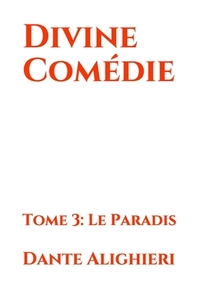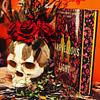Take a photo of a barcode or cover
adventurous
challenging
dark
reflective
slow-paced
They should add a circle in hell where the punishment is to read this book.
However, Dante girlbossed so hard when he put all his enemies in hell and made his childhood crush a dame in heaven. Slay I guess.
However, Dante girlbossed so hard when he put all his enemies in hell and made his childhood crush a dame in heaven. Slay I guess.
Uma obra estrondosa, monumental.
Admito que algum do seu significado me tenha ultrapassado, mas já estava à espera disso. Aliás, cumpri o meu objectivo nesta primeira leitura: ler sem receios e apreciar a leitura, sem preocupar-me com análises. Deixo isso para a próxima.
Sinceramente, não me sentia preparada para ler esta obra. É uma obra intimidante a vários níveis e evitei lê-la durante alguns anos por causa disso. Existem obras que pensamos que só a elite literária pode ler e compreender, e que uma pessoa normal tem receio de ler por sentir que está a ter mais olhos do que barriga.
Bem, estou farta. Claro que não compreendo tudo. Os próprios estudiosos da obra não entendem tudo. Mas é melhor ler, do que ficar na ignorância.
O tradutor, Vasco Graça Moura, fez um trabalho maravilhoso e lindo, respeitando a obra e aos seus leitores. Os meus agradecimentos profundos, e parabéns.
Quanto à obra, é brilhante. A estrutura (três partes, talvez reflexo da Santíssima Trindade), a rima, o ritmo são lindos. Recomendo ler em voz alta, a sonoridade encanta.
Dante é um artesão, e usa o seu engenho para criar um universo em que mitologia romana (de religião politeísta), histórias da fé cristã, e política e história do século XIII coexistem em harmonia.
Confesso que adorei a primeira parte, o Inferno, mais do que qualquer outra.
Ao longo de 100 cantos, o autor leva-nos numa viajem. Agarrai-vos aos vossos lugares e usufruí cada verso.
Admito que algum do seu significado me tenha ultrapassado, mas já estava à espera disso. Aliás, cumpri o meu objectivo nesta primeira leitura: ler sem receios e apreciar a leitura, sem preocupar-me com análises. Deixo isso para a próxima.
Sinceramente, não me sentia preparada para ler esta obra. É uma obra intimidante a vários níveis e evitei lê-la durante alguns anos por causa disso. Existem obras que pensamos que só a elite literária pode ler e compreender, e que uma pessoa normal tem receio de ler por sentir que está a ter mais olhos do que barriga.
Bem, estou farta. Claro que não compreendo tudo. Os próprios estudiosos da obra não entendem tudo. Mas é melhor ler, do que ficar na ignorância.
O tradutor, Vasco Graça Moura, fez um trabalho maravilhoso e lindo, respeitando a obra e aos seus leitores. Os meus agradecimentos profundos, e parabéns.
Quanto à obra, é brilhante. A estrutura (três partes, talvez reflexo da Santíssima Trindade), a rima, o ritmo são lindos. Recomendo ler em voz alta, a sonoridade encanta.
Dante é um artesão, e usa o seu engenho para criar um universo em que mitologia romana (de religião politeísta), histórias da fé cristã, e política e história do século XIII coexistem em harmonia.
Confesso que adorei a primeira parte, o Inferno, mais do que qualquer outra.
Ao longo de 100 cantos, o autor leva-nos numa viajem. Agarrai-vos aos vossos lugares e usufruí cada verso.
Everytime I read a new translation of The Divine Comedy, or even just the Inferno portion, it sheds new light and new perspectives on my favorite piece of literature.
Purgatorio and (I assume Paradiso) have so much less energy behind the writing and even though the chapters are shorter it feels like a slog to get through.
Maybe I'll try read the later 2 books again independently
Inferno: 3.5/5
Purgatorio: 1/5
Paradiso DNF
Maybe I'll try read the later 2 books again independently
Inferno: 3.5/5
Purgatorio: 1/5
Paradiso DNF
adventurous
challenging
dark
mysterious
slow-paced
First things first: I shipped the hell (pun totally intended) out of Dante and Virgil and nothing anyone says can change my mind.
For serious though, I'll start off with reviewing the translation. This is my first time reading The Divine Comedy, and I don't speak a lick of Italian, so keep that in mind, but I overall enjoyed Robin Kirkpatrick's translation. From what I could see online, it looks like they did a very true-to-Dante's-language translation, where they didn't distort the text in the interest of forcing the rhyme scheme or alliterations while still managing to keep the meter. That being said, Italian has always been a language I've wanted to learn and this only furthers that desire: I think being able to read it with all it's original language and all the tools Dante had at his dispose.
As for the Comedy itself. It's important to note that I'm an atheist who is somewhat interested in Christian mythology.
I very much enjoyed the Inferno. It was visceral and dark, and painted a terrific (in both senses of the word) vision of Hell. I enjoyed the psychology, and the character development, and pretty much all there was to it.
I also liked Purgatorio, though not quite as much. I have always been super interested in the Seven Deadly Sins, and knowing they arose from Dante made The Divine Comedy something I've been wanting to read since 9th grade. That being said, this isn't quite what I had hoped for, but it was still fantastic to read. Again, there's human connection, with people striving to be the best they can be. I did notice the immediate shift in language - while Hell was dark and stifling and oppressive, Purgatory felt open and natural. It felt like there was a weight that lifted from the shoulders nearly immediately. The Garden of Eden culminates all of this, and the last three Cantos are stunning.
I... did not enjoy Paradiso. Maybe if I was Christian I would have enjoyed it more, but I just... super wasn't into it. The language is beautiful, weightless, and bright, but everything else about it just... dragged. I also found it jarringly racist sometimes, and Dante's occasional praises of the crusades, and how the blood of heretics watered the garden of The Church just... didn't sit right with me. Honestly, the whole thing dragged.
It does make me wonder what books from the present day people might still be reading in 700 years. I was genuinely surprised, after reading the Divine Comedy, that it's still as widely read as it is given how much it is enmeshed in the current events of Dante's time.
For serious though, I'll start off with reviewing the translation. This is my first time reading The Divine Comedy, and I don't speak a lick of Italian, so keep that in mind, but I overall enjoyed Robin Kirkpatrick's translation. From what I could see online, it looks like they did a very true-to-Dante's-language translation, where they didn't distort the text in the interest of forcing the rhyme scheme or alliterations while still managing to keep the meter. That being said, Italian has always been a language I've wanted to learn and this only furthers that desire: I think being able to read it with all it's original language and all the tools Dante had at his dispose.
As for the Comedy itself. It's important to note that I'm an atheist who is somewhat interested in Christian mythology.
I very much enjoyed the Inferno. It was visceral and dark, and painted a terrific (in both senses of the word) vision of Hell. I enjoyed the psychology, and the character development, and pretty much all there was to it.
I also liked Purgatorio, though not quite as much. I have always been super interested in the Seven Deadly Sins, and knowing they arose from Dante made The Divine Comedy something I've been wanting to read since 9th grade. That being said, this isn't quite what I had hoped for, but it was still fantastic to read. Again, there's human connection, with people striving to be the best they can be. I did notice the immediate shift in language - while Hell was dark and stifling and oppressive, Purgatory felt open and natural. It felt like there was a weight that lifted from the shoulders nearly immediately. The Garden of Eden culminates all of this, and the last three Cantos are stunning.
I... did not enjoy Paradiso. Maybe if I was Christian I would have enjoyed it more, but I just... super wasn't into it. The language is beautiful, weightless, and bright, but everything else about it just... dragged. I also found it jarringly racist sometimes, and Dante's occasional praises of the crusades, and how the blood of heretics watered the garden of The Church just... didn't sit right with me. Honestly, the whole thing dragged.
It does make me wonder what books from the present day people might still be reading in 700 years. I was genuinely surprised, after reading the Divine Comedy, that it's still as widely read as it is given how much it is enmeshed in the current events of Dante's time.
it's a classic but i loooove it.
i went highlighting all the book.
i went highlighting all the book.







